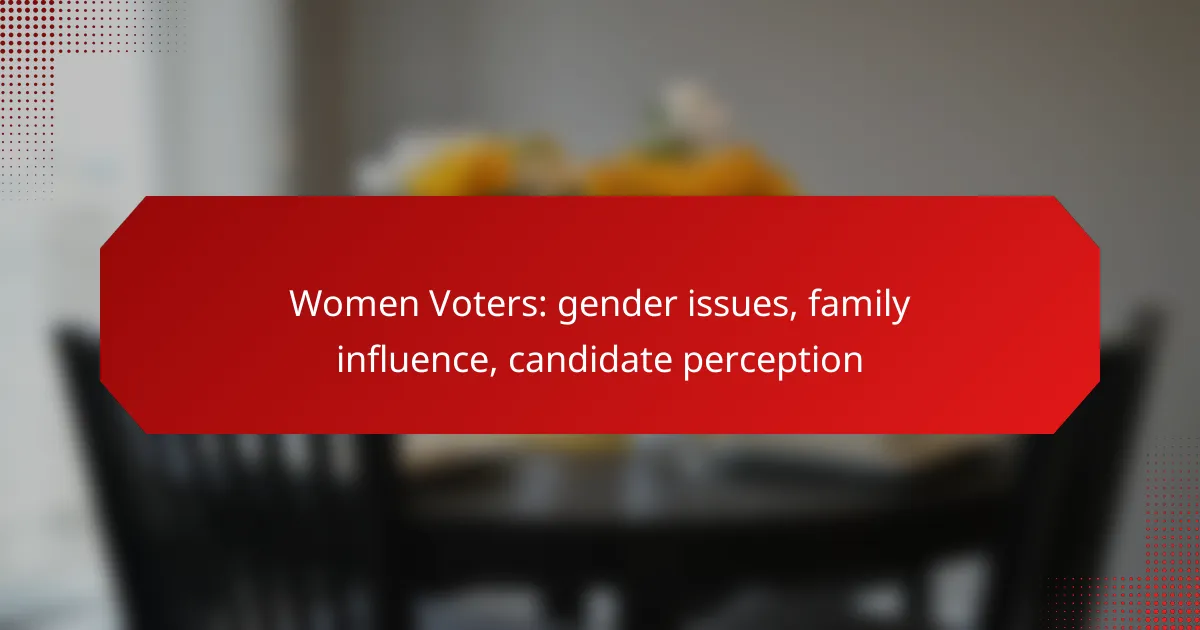Women voters in the United States are significantly influenced by gender issues, which shape their priorities and perceptions of candidates. Factors such as reproductive rights and workplace equality resonate deeply, while family influences further mold their political beliefs and voting decisions. Additionally, women often evaluate candidates based on empathy and relatability, prioritizing personal connections and alignment with their values in the electoral process.
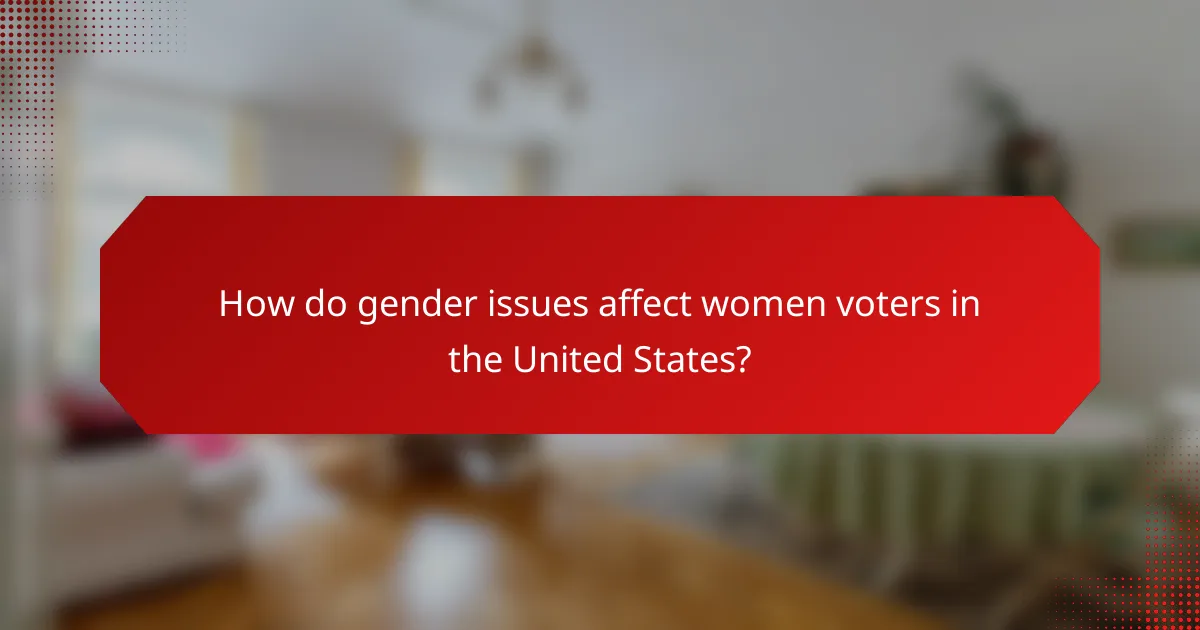
How do gender issues affect women voters in the United States?
Gender issues significantly influence women voters in the United States by shaping their priorities and perceptions of candidates. Factors such as reproductive rights, workplace equality, and social justice resonate deeply, often guiding their voting decisions.
Impact of gender inequality on voting behavior
Gender inequality affects voting behavior by highlighting disparities in economic opportunities, healthcare access, and social rights. Women may prioritize candidates who advocate for policies that address these inequalities, leading to higher support for progressive platforms.
For instance, issues like equal pay and maternity leave can sway women voters towards candidates who actively promote legislation aimed at closing these gaps. As a result, women are more likely to engage in the electoral process when they feel their concerns are represented.
Role of women’s rights movements
Women’s rights movements have played a crucial role in mobilizing women voters by raising awareness about gender-specific issues. These movements have historically influenced legislation and public opinion, making gender equality a central topic in political discourse.
Organizations advocating for women’s rights often encourage voter registration and participation, emphasizing the importance of voting as a means to effect change. This grassroots activism has led to increased voter turnout among women, particularly in elections where gender issues are at the forefront.
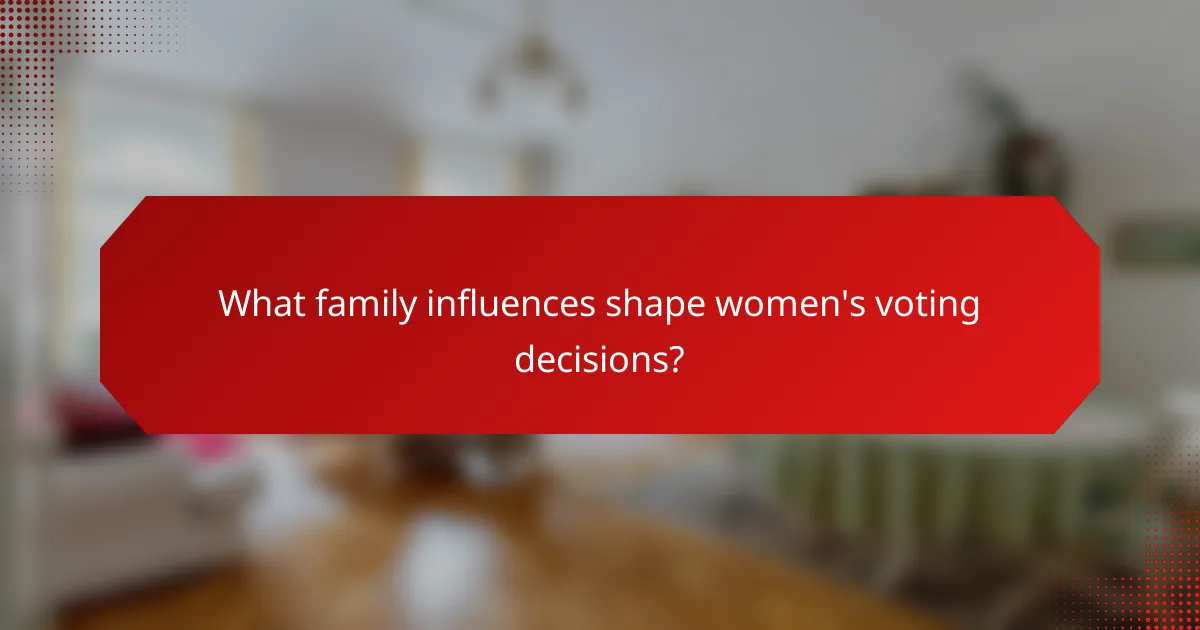
What family influences shape women’s voting decisions?
Family influences play a significant role in shaping women’s voting decisions, often rooted in the political beliefs and values instilled during childhood and reinforced through family dynamics. Understanding these influences can provide insights into voting patterns and preferences among women.
Parental political beliefs
Parental political beliefs are foundational in shaping a woman’s political identity. Children often adopt the political views of their parents, which can significantly impact their voting behavior later in life. For instance, women raised in households with strong liberal or conservative ideologies may lean towards candidates who align with those beliefs.
Additionally, discussions around political issues at home can foster engagement and awareness. Parents who actively participate in political discourse tend to raise children who are more informed and likely to vote, creating a cycle of political involvement.
Influence of spouse and children
The influence of a spouse and children can also significantly affect women’s voting decisions. Many women consider their family’s needs and values when evaluating candidates, often prioritizing issues like education, healthcare, and family policies. This consideration can lead to voting patterns that reflect the collective interests of the household.
Moreover, discussions with a spouse or children about political issues can lead to a more informed decision-making process. Women may find themselves swayed by their partner’s opinions or their children’s concerns, making family dynamics a crucial factor in their voting choices.

How do women perceive candidates differently?
Women often perceive candidates through the lens of empathy, relatability, and alignment with their values. This perspective can significantly influence their voting decisions, as women tend to prioritize personal connections and relevant policy issues when evaluating candidates.
Candidate empathy and relatability
Women voters frequently seek candidates who demonstrate genuine empathy and relatability. They are more likely to support candidates who share similar life experiences or who actively listen to women’s concerns. For instance, candidates who discuss issues like childcare or workplace equality in personal terms may resonate more with female voters.
Relatability can also be enhanced through storytelling. Candidates who share personal anecdotes about their own challenges or triumphs can create a stronger bond with women voters. This emotional connection often translates into increased trust and support at the polls.
Importance of policy issues to women
Women voters prioritize specific policy issues that directly impact their lives and families. Key areas of concern often include healthcare, education, reproductive rights, and economic opportunities. Candidates who address these topics with clear, actionable plans are more likely to gain support from female voters.
Additionally, women often evaluate candidates based on their stances on social justice and equality. For example, policies aimed at closing the gender pay gap or improving parental leave can significantly influence women’s perceptions of candidates. Understanding these priorities is crucial for candidates aiming to engage effectively with female voters.

What strategies can candidates use to engage women voters?
Candidates can effectively engage women voters by employing targeted messaging that resonates with their experiences and concerns, as well as implementing community outreach initiatives that foster connection and trust. These strategies help candidates address the unique challenges women face and create a more inclusive political environment.
Targeted messaging on gender issues
Targeted messaging on gender issues involves crafting campaign communications that directly address the specific needs and interests of women. This can include topics such as reproductive rights, equal pay, and workplace discrimination. Candidates should use language and examples that reflect women’s diverse experiences to create a sense of relatability.
To enhance effectiveness, candidates can segment their messaging based on demographics, such as age or socioeconomic status. For instance, younger women may prioritize climate change and education, while older women might focus on healthcare and retirement security. Tailoring messages to these groups can significantly improve engagement.
Community outreach initiatives
Community outreach initiatives are essential for building relationships with women voters. Candidates should participate in local events, host town halls, and collaborate with women’s organizations to demonstrate their commitment to women’s issues. These interactions provide opportunities for candidates to listen to constituents and understand their concerns.
Additionally, forming partnerships with local leaders and influencers can amplify outreach efforts. For example, candidates might work with women’s advocacy groups to organize workshops or forums that address specific issues affecting women in the community. This grassroots approach not only informs voters but also fosters a sense of community and shared purpose.
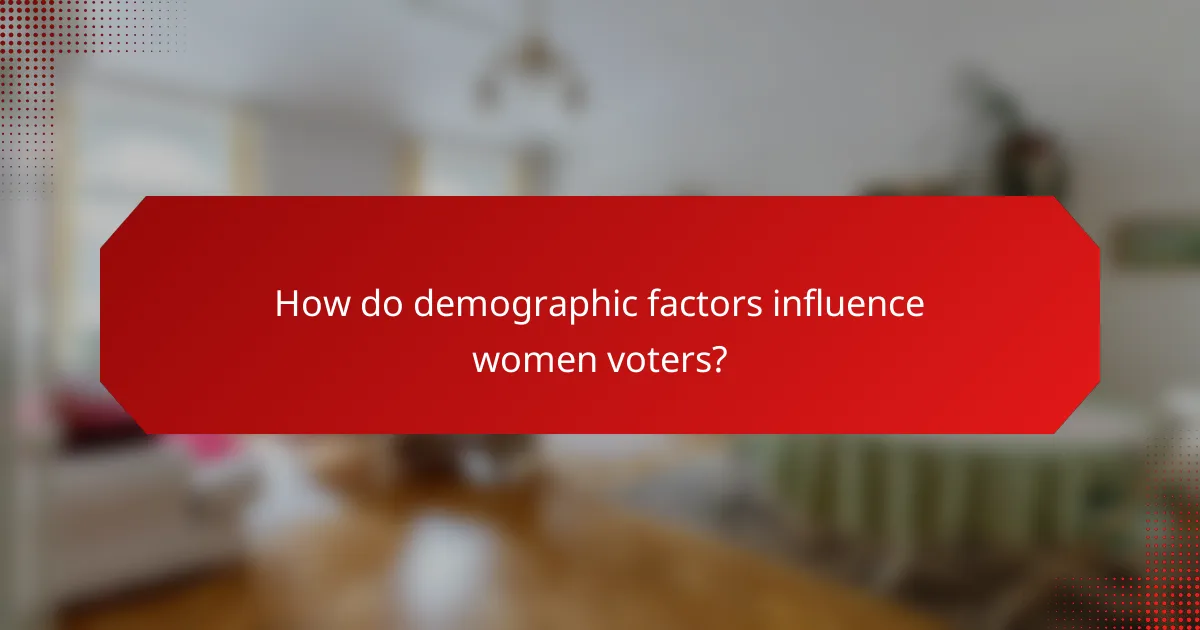
How do demographic factors influence women voters?
Demographic factors significantly shape the preferences and behaviors of women voters. Key elements such as age, education level, ethnicity, and cultural background play crucial roles in determining political priorities and candidate perceptions among women.
Age and education level
Age and education level are pivotal in influencing the voting patterns of women. Younger women, particularly those with higher education, tend to prioritize issues like climate change and social justice, while older women may focus more on healthcare and retirement security.
For example, women in their twenties and thirties often engage more with progressive candidates, while those in their forties and fifties might lean towards candidates who emphasize stability and economic growth. Understanding these trends can help candidates tailor their messages effectively.
Ethnicity and cultural background
Ethnicity and cultural background significantly impact the political views of women voters. Women from diverse ethnic backgrounds may prioritize different issues based on their community’s unique challenges and experiences, such as immigration reform or racial equity.
For instance, African American and Latina women often emphasize social justice and economic opportunity, while Asian American women might focus on education and healthcare access. Recognizing these differences is essential for candidates aiming to connect with a broader female electorate.
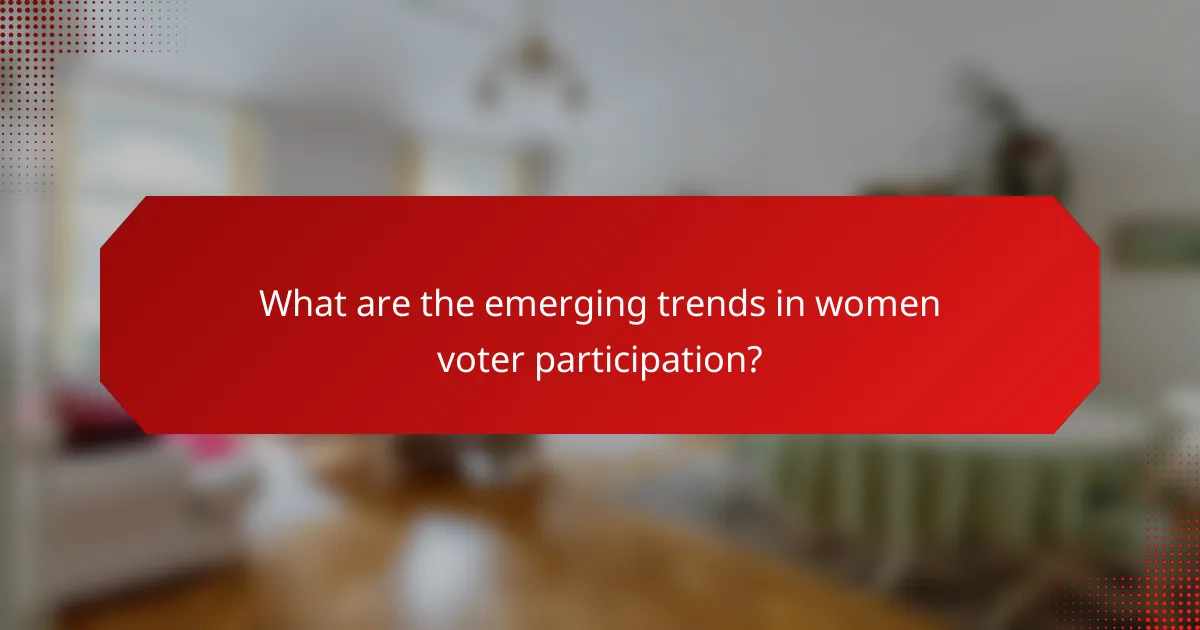
What are the emerging trends in women voter participation?
Women voter participation is increasingly characterized by heightened engagement in local elections and the significant influence of social media on mobilization efforts. These trends reflect a growing awareness and activism among women voters, shaping electoral outcomes in various communities.
Increased engagement in local elections
Women are showing greater involvement in local elections, often prioritizing issues that directly affect their communities, such as education, healthcare, and public safety. This engagement can lead to higher voter turnout rates, particularly in municipal and state elections where local policies are decided.
To capitalize on this trend, candidates should focus on grassroots campaigns that address the specific needs and concerns of women voters. Engaging with local organizations and hosting community forums can foster a sense of connection and encourage participation.
Impact of social media on voter mobilization
Social media platforms are playing a crucial role in mobilizing women voters by providing a space for discussion, information sharing, and community building. Campaigns that effectively utilize social media can reach a wider audience, particularly younger women who are more active online.
To enhance voter mobilization through social media, candidates should create targeted content that resonates with women, such as personal stories and relatable messaging. Additionally, leveraging influencers and community leaders can amplify outreach efforts and encourage more women to participate in the electoral process.
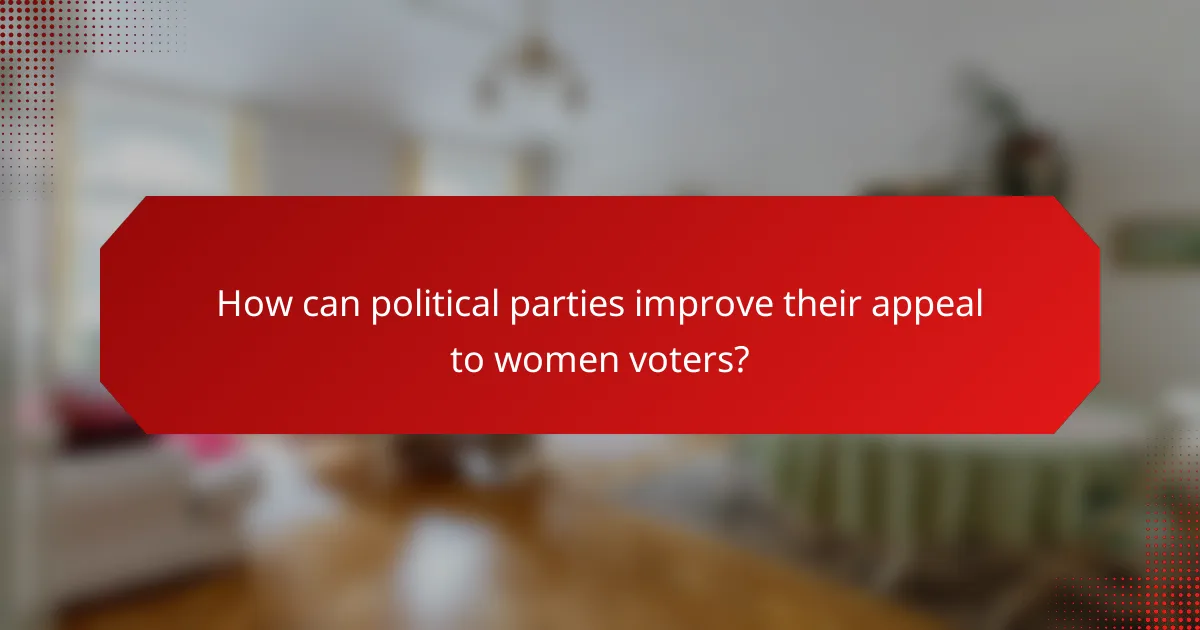
How can political parties improve their appeal to women voters?
Political parties can enhance their appeal to women voters by addressing key gender issues, promoting family-friendly policies, and ensuring candidates resonate with women’s values and concerns. Understanding the unique perspectives and priorities of women is essential for effective outreach and engagement.
Addressing Gender Issues
To attract women voters, political parties must prioritize gender issues such as equal pay, reproductive rights, and workplace discrimination. These topics resonate deeply with many women, and addressing them can demonstrate a party’s commitment to gender equality.
Parties should actively engage in discussions about policies that support women’s rights and highlight their plans to combat gender-based violence. This can include proposing legislation that protects women and promotes their participation in all sectors of society.
Family Influence on Voting Behavior
Family dynamics play a significant role in shaping women’s voting behavior. Many women consider the impact of policies on their families when making electoral decisions. Political parties should emphasize how their platforms support family welfare, childcare, and education.
Creating policies that alleviate the financial burden of raising children, such as tax credits or affordable childcare options, can resonate with women voters. Tailoring messages that reflect the importance of family values can strengthen connections with this demographic.
Candidate Perception and Representation
The perception of candidates significantly influences women voters. Women are more likely to support candidates who they believe understand their challenges and advocate for their interests. Political parties should focus on promoting female candidates and ensuring diverse representation within their ranks.
Highlighting the achievements and backgrounds of female candidates can help build trust and relatability. Additionally, training candidates to communicate effectively about issues that matter to women can enhance their appeal and increase voter engagement.
